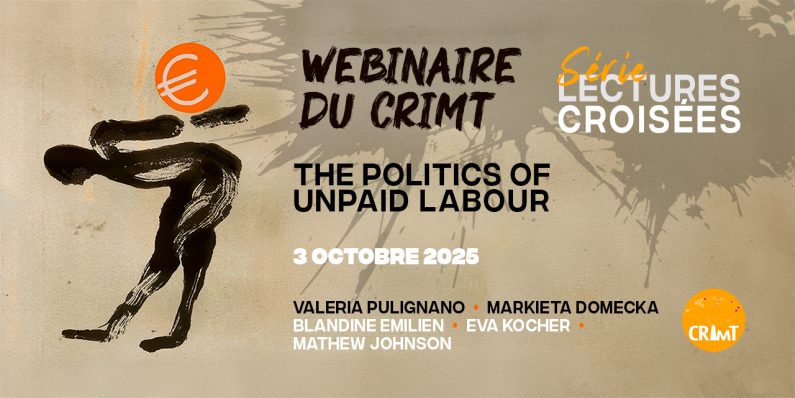Nous avons le plaisir de vous convier à un prochain webinaire du CRIMT, organisé dans le cadre de sa série « Lectures croisées ». Cette séance portera sur le nouvel ouvrage de Valeria Pulignano et Markieta Domecka, The Politics of Unpaid Labour: How the Study of Unpaid Labour Can Help Address Inequality in Precarious Work, publié en 2025 chez Oxford University Press.
Valeria Pulignano y représentera les deux autrices. Elle sera accompagnée de trois chercheur.euses invité.es — Blandine Émilien (University of Bristol), Mathew Johnson (University of Manchester) et Eva Kocher (European University Viadrina Frankfurt) — qui livreront leurs perspectives sur l’ouvrage en s’appuyant sur leurs propres travaux de recherche. La discussion sera animée par Dalia Gesualdi-Fecteau (Université de Montréal), directrice du CRIMT.
Le webinaire aura lieu le vendredi 3 octobre 2025, de 9 h 30 à 11 h (heure de Montréal), sur la plateforme Zoom. L’inscription est gratuite mais obligatoire.
Veuillez noter que le lien de connexion sera envoyé par courriel après l’inscription. Veuillez également noter que ce séminaire sera présenté en anglais. Les personnes participantes pourront toutefois poser leurs questions en français, et l’équipe du CRIMT se chargera de les traduire en anglais.
Tout le monde est bienvenu !
Pour un avant-goût du livre, nous vous invitons à visionner la courte capsule ci-dessous, puis à consulter le résumé.
Résumé
This book introduces a theory of the politics of unpaid labour, advancing our understanding of inequality within the context of precarious work. Arguing that this theory can help address the inequalities perpetuating the dynamics and processes underpinning stigma which surround the rise of precarious work under labour market reforms and societal and technological changes, the book forges a link between the micro properties of the social system and its macro-level structural patterns. The former relates to the motivations and meanings individuals attribute to the unpaid labour they perform in a context where employment is precarious, while the latter refers to how individuals build resilience through sustaining unpaid labour by accessing resources found within the private, social, and financial sphere of the family as well as in regulatory arrangements at the level of the state and other social institutions. The book’s empirical section is based on extensive research comparing meanings of unpaid labour in creative dance, residential care, and online freelancing in Europe. The theoretical section advances current discussion in three ways. First, it establishes the characteristics differentiating employment from self-employment, and how these lead to a revised definition of unpaid labour. Second, it illustrates that unpaid labour is both shaped by class and serves to reproduce class interests, revealing ongoing changes in welfare, employment, and state institutional policies. Third, it considers the necessity to establish conditions within the labour market conducive to genuinely cultivating and honouring the diversity of human capabilities and actions within labour structures and promoting their manifestation.



